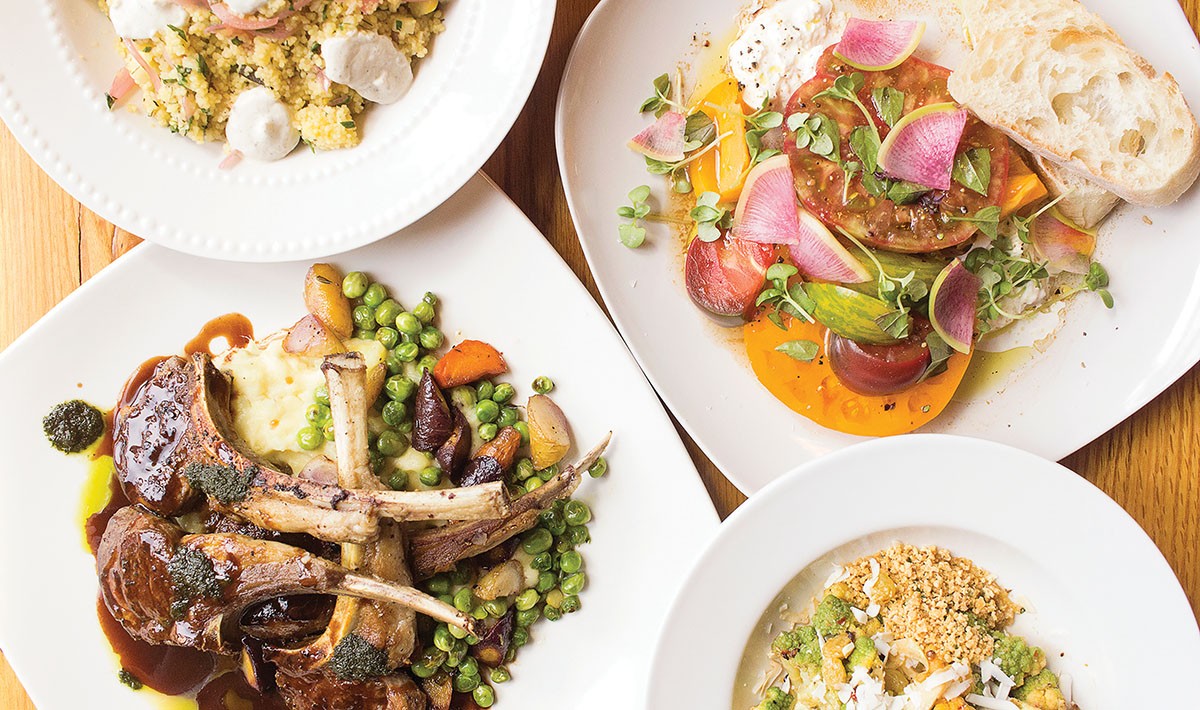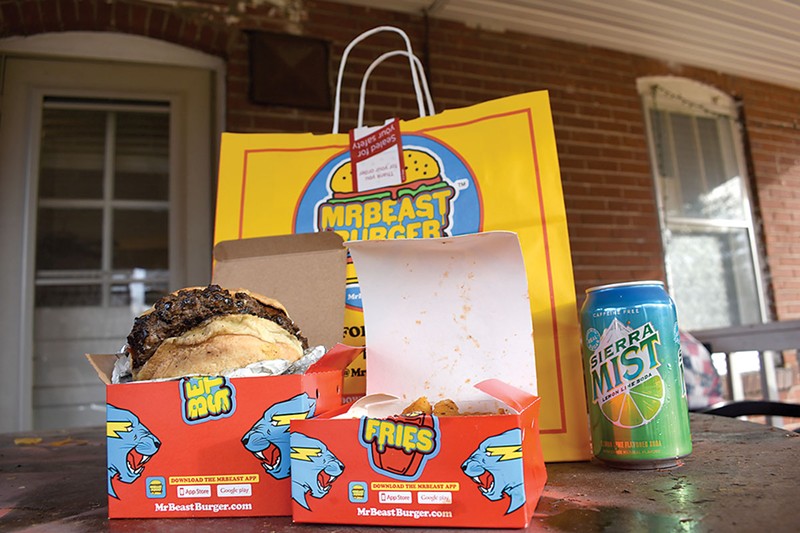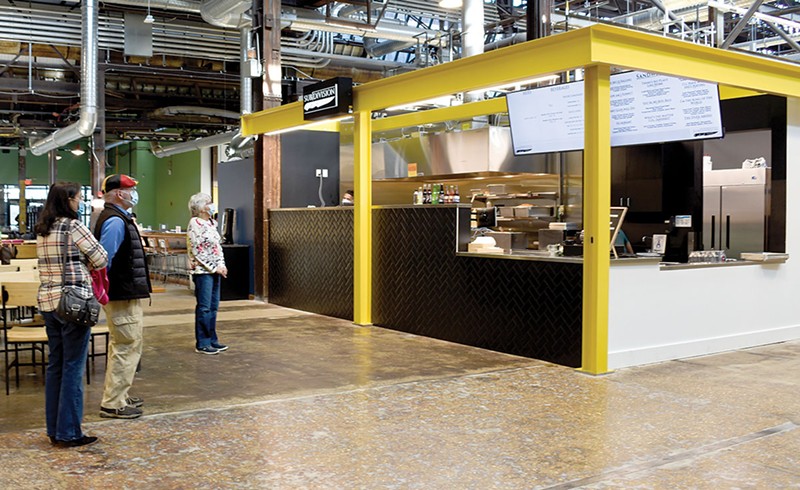Polite Society owner Brian Schmitz found himself walking through an empty dining room last spring as first the pandemic safety mandates set in. Chairs sat on top of tables and the comforting low light had given way to strong overhead lights in absence of customers. On a normal night, the popular Lafayette Square restaurant would have been buzzing. Schmitz's team had managed to achieve the elusive goal of the perfect neighborhood spot since opening three years earlier. Artful, multi-course meals from the talented kitchen staff had won over food critics since its first days, but the draw of the place was fueled just as much by the experience of being there. Exposed brick walls rose to pressed-tin ceilings, and bookshelves warmed the rooms, creating a space that was upscale but unfussy. As the name implied, attentive, graceful service was a hallmark of an evening in the care of Schmitz's staff.
But everything was changing fast that spring. Suddenly, the neighborhood favorite had been tipped on its axis, forced to adapt to the new dining landscape. The City of St. Louis implemented its first stay-at-home order on March 23, 2020, temporarily ending in-person dining. The new health orders allowed for takeout and delivery, but a quick, impersonal handoff was the opposite of the model that had made Polite Society successful. As the chaos of the pandemic set in, Schmitz knew he had to figure out how to keep people employed in a constructive way with a dining room he couldn't fill and a menu that was not geared towards delivery or curbside. "We're Polite Society... the foods are engineered to be an in-person experience," says Schmitz. "You're not going to necessarily have a $40 plate of scallops delivered to your house four days a week; it's just a natural thing."
The same was true three blocks away at Bellwether, the even fancier sibling to Polite Society. Suddenly, Schmitz and his partner Johnathan Schoen had two restaurants with full staffs, no guests and no revenue. Unsure of when that dire equation might shift, Schmitz and Schoen turned to their employees who suggested a new strategy: a ghost kitchen.
The idea of ghost kitchens — ephemeral takeout concepts temporarily haunting the underused spaces of established or bygone restaurants —predated the pandemic, but their purpose took on a new twist that spring. Rent and bills didn't go away with the COVID-19 pandemic, but neither did the demand for food. Originally intended as a way for would-be restaurants to test out new ideas before committing to a full-blown brick-and-mortar, the idea now became a way to keep existing restaurants afloat. Ghost kitchens gave restaurant owners a means to adapt to a new dining environment for which no one had prepared.
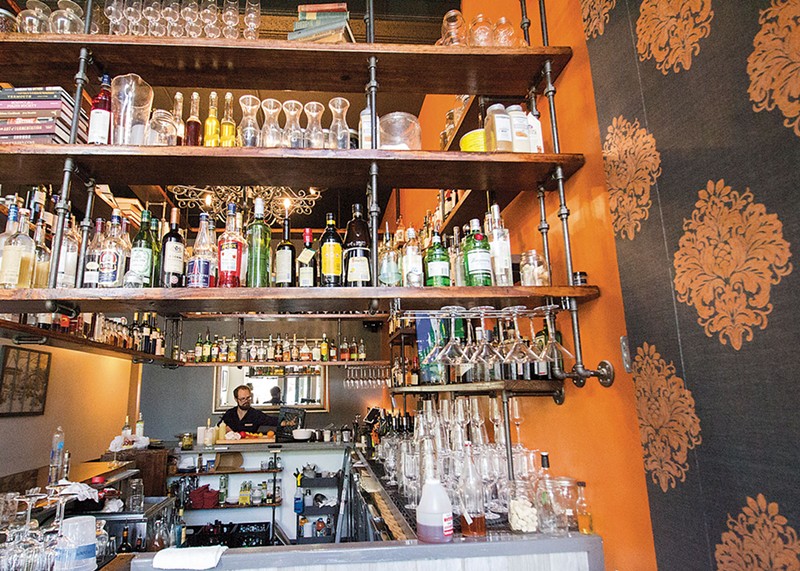
For the combined staffs of Polite Society and Bellwether, a new ghost kitchen format emerged quickly from long-running, in-house sandwich-making competitions. Pre-pandemic, the team would regularly grab hamburger buns and use ingredients from the kitchen to make their sandwiches.
"Everyone's got a favorite sandwich, something they make themselves late at night," says Schmitz.
The informal contests morphed naturally into a more formal operation that they called Sub Division. Chefs and line cooks who had been turning out filet mignon and halibut with miso butter just weeks before were now cranking out to-go sandwiches with movie-themed names such as There's No Crying in Baseball and I Believe You Have My Stapler.
The idea was a quick success with stir-crazy St. Louisans, so much so that Schmitz and Schoen began to wonder if there was life for Sub Division beyond its ghostly beginnings.
Restaurant owners and their staffs in St. Louis and beyond were making similar decisions last spring and summer. The pandemic has been a time of desperation, but also innovation. Ideas for pizza shops, to-go soup deliveries and curbside cocktails emerged from "maybe someday" daydreams for a trial run. Chefs and restaurant owners found that through ghost kitchens they could keep at least some of their staff members employed while making use of product and space that would otherwise go to waste. Instead of opening a separate concept in different locations, ghost kitchens allowed restaurateurs to try out unique dining concepts while using the infrastructure of up-and-running restaurants. An air of "now or never" flowed over the industry. And now, more than twenty months in, we're still figuring out the long-term effects of all those new ideas on the local dining scene.
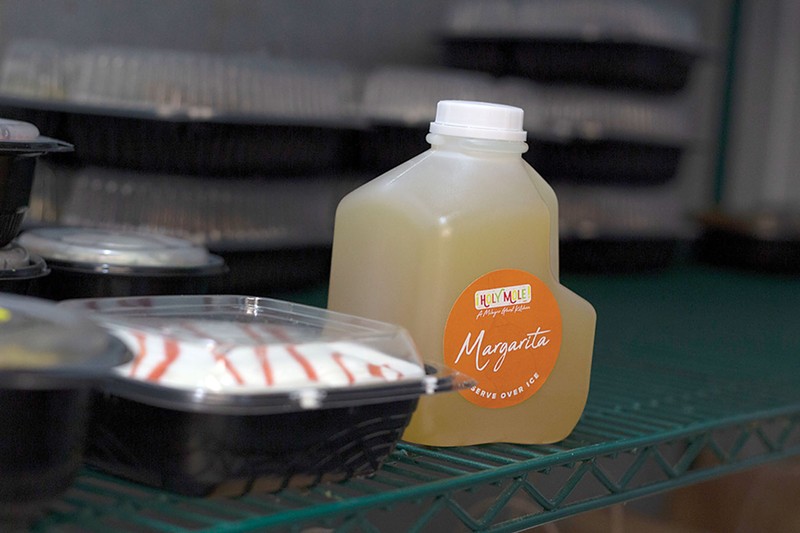
More than a few in the surge of ghost kitchens appeared and disappeared without much notice. Others evolved from the temporary into their own full-fledged restaurants. And some were an opportunity to reach back into old favorites for short-lived revivals of loved and missed dishes.
That was true of Mission Taco co-owner Jason Tilford. Like Schmitz and Schoen, Tilford had to find a way to operate his restaurant group within the ever-changing constraints of COVID-19 restrictions. He found the perfect solution in Mission Taco's commissary kitchen, which was tailor-made for a ghost kitchen. Typically, the commissary provided a centralized operation to produce queso, chips and salsa for the local chain's restaurants. But it was also ideal for a ghost kitchen — and it gave Tilford an opportunity to bring back a popular creation.
The new ghost kitchen, called Holy Mole, honored Tilford's former restaurant, Milagro Modern Eatery. The former Webster Groves eatery had closed in 2018, and guests still talked to Tilford about its beloved mole sauce. Tilford knew there was still demand for some of Milagro's favorite dishes, so he built his new ghost kitchen around it. Aside from providing Holy Mole's catchy name, the spirit of Milagro inspired much of the menu, which featured tuna ceviche, carne asada, squash blossoms, and, of course, dishes focused on the traditional Mexican sauce and marinade, mole.
After a successful Valentine's Day special, though, Holy Mole closed, three months after opening. He says the summer weather that allowed for more outdoor dining and restaurants reopening for dine-in service contributed to dwindling orders. Tilford says it had a good run, but it was always meant to be temporary. "As much as we loved it and the people that got it loved it, it just kind of became a burden more than a fun thing to do," Tilford says. "You get over it, everything's changing, everything's fluid. You just get on with the next thing."
For some, a ghost kitchen idea was the next thing. Chris Kelling and Adam Altnether, co-owners of Elmwood in Maplewood, faced a lot of the same challenges as Polite Society and Bellwether. An upscale modern restaurant, Elmwood was built around a model of comfortable, elegantly prepared dishes to be enjoyed under the low lights of its stylish dining room. But when the pandemic hit, Kelling and Altnether made a quick turn to a takeout pizza joint. Kelling says that Pizza Champ had been a concept in their back pocket for a while, and it fit the need for something more accessible for carryout service. With lockdown mandates in place, it seemed like the perfect time to try it out. Kelling calls it their "pandemic pivot," which not only allowed them to stay busy but also offered customers a more budget-friendly menu. The idea took off. Most nights, the side street next to the restaurant was lined with customers waiting in their cars for pizzas.
From the start, Kelling says, their ultimate hope was to eventually move Pizza Champ to its own spot as a more casual eatery. That's now expected to happen. After operating solely as a takeout spot for more than a year, Elmwood has slowly begun to reopen for in-person dining — and Pizza Champ is set to become a standalone restaurant in the new year. "We're very fortunate to have created a long list of new regulars over the past year ordering pizza that we never saw at the restaurant," Kelling says. "It's really opened a whole new portal to new guests which is great." Going casual has been a popular move during the pandemic. Restaurants needed dishes that were affordable, but also rugged enough to survive takeout containers and the travel from kitchen to home. Like Elmwood with Pizza Champ, Revel Kitchen found success in its pandemic plunge into carryout pizza with Motortown Pizza in Brentwood. Co-owner Angelica Lusky says they're planning to expand Revel and their ghost kitchen concepts with another location soon in Kirkwood. But rather than opening a second Motortown, Lusky says they'll consider other ghost kitchen ideas. "There's a lot of pizza here [in Kirkwood] already so we just want to fill a void," says Lusky. "Whatever that might be, we just want to go by whatever need is in the area."
There's a spirit of perseverance in the ghost kitchens around St. Louis — a sense of local restaurateurs scrambling and succeeding against the odds. But the strategy has attracted large national players as well. The pandemic has forced even chain restaurants, not exactly known for their nimbleness, to deviate from the norm to keep up. One of the corporate players, Virtual Dining Concepts, has found spots in the empty or underused kitchens of chain restaurants to allow celebrities, such as Tyga and famous YouTuber, MrBeast, to test out their recipes.
Brio's Tuscan Grille in Plaza Frontenac, for instance, works with Virtual Dining Concepts and is home to four separate ghost kitchens. Inside the Tuscan-styled dining room, tables are set with white linen cloth. Entering to pick up an order of burger and fries can feel a bit like maybe the GPS got the directions wrong, but the mix of cultures is part of the arrangement these days. A choice of flavors for drummies at Wing Squad, burgers from MrBeast Burger, five different cookies from Mariah's Cookies, and Guy Fieri's Flavortown all reside in Brio's kitchen. The dining room, which is now seating guests to dine on Brio's menu, remains calm with classical music playing ambiently over the speakers while carryout customers pick up jalapeno poppers to go.
It's still too early to tell how many ghost kitchen ideas will last beyond the pandemic, and which will disappear in the swirl of time. However, the successful transition from ghost kitchen to real-life restaurant for places such as Pizza Champ and Revel Kitchen's forthcoming Kirkwood spot hint at the long-term changes that lockdown experimentation is already making on St. Louis' dining scene. In Lafayette Square, Polite Society and the Bellwether are once again taking reservations and serving guests — a return to what the two restaurants do best. Even now, walking through a dining room that appears much more like it did before the pandemic, Schmitz looks forward to the possibilities that ghost kitchens bring to the restaurant industry, proving that this is one outgrowth of the crisis that he and his fellow restaurant owners are likely to continue to embrace.
And he was right about a future for Sub Division, the sandwich shop they cooked up in those early days of pandemic desperation. The now-former ghost kitchen has a permanent spot in the bustling food hall of The Foundry. On a recent Thursday, people wander through the massive space, deciding which of the 13 restaurants to choose. Sub Division sits comfortably right in the heart of it. Although Sub Division is significantly more casual than Polite Society and the Bellwether, remnants of the upscale can still be found in the sleek and modern design of the new restaurant's menu and signage.
"We have a love for the food industry and the business, and we hope that maybe this is the beginning," Schmitz says. "We're just really excited and curious to see where the world takes us."

